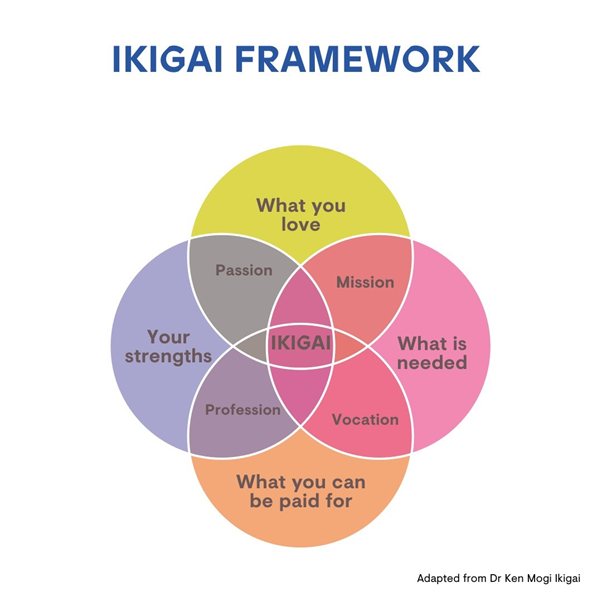
The Ikigai framework is a Japanese concept that represents the intersection of four key elements that help us find a sense of purpose and meaning in work and in our lives. The elements include: what you love, what you are good at, what is needed, and what you can be compensated for. It guides you to pursue activities that are fulfilling, leverage your strengths, address important needs, and provide financial stability, leading to greater satisfaction and alignment with your true self. Using the Ikigai framework as a tool to find meaning in your role at work involves reflecting on the four key components.
1. Identify What You Love
- Reflect on the aspects of your role that give you joy and make you feel passionate. This could be tasks that energise you, interactions with colleagues, or activities that you look forward to.
- Ask yourself: What parts of my job excite me or make me lose track of time? What are the most fulfilling activities I engage in?
Action: List down the elements of your work that bring you satisfaction and a sense of accomplishment.
2. Recognise What You Are Good At
- Assess your strengths, skills, and expertise. This is not just what you enjoy, but what you excel at in your role.
- Ask yourself: What are my skills? This can include both technical skills and soft skills such as problem-solving, communication, or leadership.
Action: Write down the areas in your role where you feel you perform strongly or where others seek your help.
3. Understand What is Needed
- Think about the larger purpose of your role. How does your work benefit the university - students, colleagues, stakeholders or the community? This is about recognising how your efforts contribute to a bigger picture.
- Ask yourself: How does my work make a positive difference? How does my role solve problems or fulfil needs within the team or the university as a whole?
Action: Reflect on the broader impact of your work and note how your role serves the needs of others.
4. Connect What You Can Be Compensated For
- Align your role with your career growth such as opportunities for development, promotions, or job security.
- Ask yourself: Is my role sustainable for my long-term career? Am I being compensated for my skills and efforts? Is this role leading me on a path of growth?
Action: Consider whether your role provides the stability or opportunities you need and how it aligns with your professional goals.
5. Find the Intersection
- Once you’ve gathered insights from the four components, find where they overlap. The overlap between what you love and what you are good at gives you passion. The overlap between what you are good at and what you can be paid for points to your role. What the world needs combined with what you love is your mission.
- When all four components intersect, you find your personal Ikigai, or the meaning in your work.
Action: Create a simple diagram to visualise these four areas, then analyse where your role fits into the intersections. Identify areas where you can make changes or adjustments to better align with your Ikigai.
6. Adapt Elements of Your Role
- Once you’ve identified areas of meaning, think about how you can adjust your role to better align with your Ikigai. This might involve:
- Taking on more projects that align with what you love.
- Enhancing skills in areas that are in demand or meaningful to you.
- Seeking out opportunities for growth or impact that align with your strengths, your personal values and the university’s values.
- Contributing to projects that are focused on the missions and values of the university.
Action: Create an action plan that includes small steps you can take to adjust your responsibilities to include these aspects or how you approach your work.
7: Reflect
- Regularly review how your role aligns with your Ikigai. As your interests or circumstances change, revisit these components to ensure you continue to find meaning and fulfilment in your work.
By using the Ikigai framework, you can align your daily work with your passions, strengths, needs, and rewards, leading to a greater sense of purpose and satisfaction in your role.
